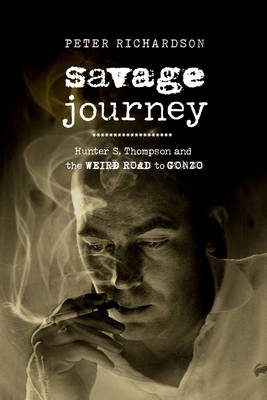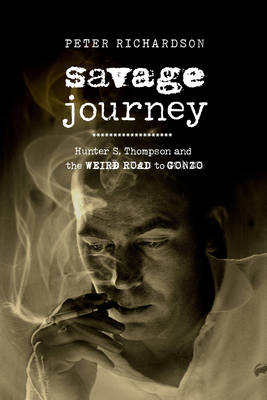
- Retrait gratuit dans votre magasin Club
- 7.000.000 titres dans notre catalogue
- Payer en toute sécurité
- Toujours un magasin près de chez vous
- Retrait gratuit dans votre magasin Club
- 7.000.0000 titres dans notre catalogue
- Payer en toute sécurité
- Toujours un magasin près de chez vous
Savage Journey
Hunter S. Thompson and the Weird Road to Gonzo
Peter Richardson
Livre relié | Anglais
37,45 €
+ 74 points
Format
Description
A superbly crafted study of Hunter S. Thompson's literary formation, achievement, and continuing relevance. Savage Journey is a "supremely crafted" study of Hunter S. Thompson's literary formation and achievement. Focusing on Thompson's influences, development, and unique model of authorship, Savage Journey argues that his literary formation was largely a San Francisco story. During the 1960s, Thompson rode with the Hell's Angels, explored the San Francisco counterculture, and met talented editors who shared his dissatisfaction with mainstream journalism. Peter Richardson traces Thompson's transition during this time from New Journalist to cofounder of Gonzo journalism. He also endorses Thompson's later claim that he was one of the best writers using the English language as both a musical instrument and a political weapon. Although Thompson's political commentary was often hyperbolic, Richardson shows that much of it was also prophetic. Fifty years after the publication of Fear and Loathing in Las Vegas, and more than a decade after his death, Thompson's celebrity continues to obscure his literary achievement. This book refocuses our understanding of that achievement by mapping Thompson's influences, probing the development of his signature style, and tracing the reception of his major works. It concludes that Thompson was not only a gifted journalist, satirist, and media critic, but also the most distinctive American voice in the second half of the twentieth century.
Spécifications
Parties prenantes
- Auteur(s) :
- Editeur:
Contenu
- Nombre de pages :
- 296
- Langue:
- Anglais
Caractéristiques
- EAN:
- 9780520304925
- Date de parution :
- 25-01-22
- Format:
- Livre relié
- Format numérique:
- Genaaid
- Dimensions :
- 152 mm x 230 mm
- Poids :
- 566 g

Les avis
Nous publions uniquement les avis qui respectent les conditions requises. Consultez nos conditions pour les avis.






